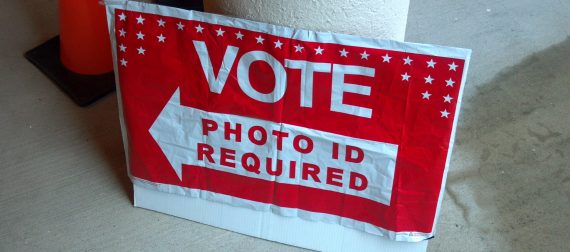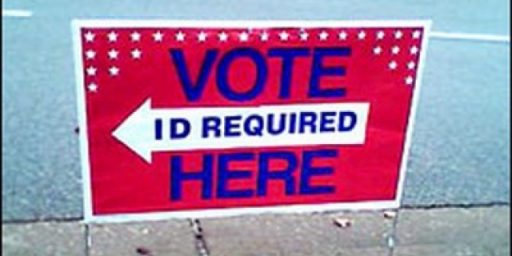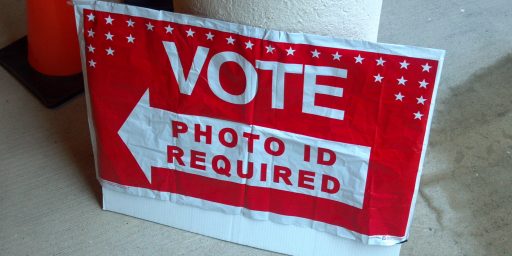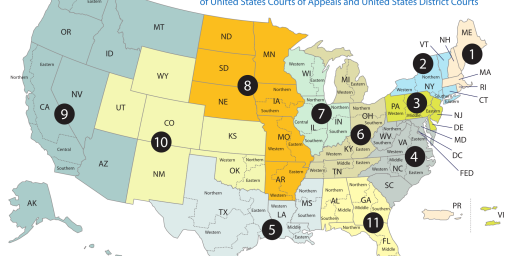Appeals Court Reverses Lower Court Ruling On Texas Voter ID Law
A Federal Appeals Court has reversed a lower court ruling that struck down Texas's Voter ID law as discriminatory against minority voters.

A three-judge panel of the Fifth Circuit Court of Appeals has reversed a District Court ruling that found the Texas Voter ID law to be discriminatory toward minority voters:
HOUSTON — A federal appeals court upheld Texas’ voter identification law on Friday, saying that it does not discriminate against black and Hispanic voters.
The decision by a three-judge panel of the United States Court of Appeals for the Fifth Circuit, in New Orleans, overturned a lower-court ruling that had struck down the law. It was the latest milestone in a yearslong legal battle over the state’s efforts to require voters to show government-issued identification in order to cast a ballot.
The panel’s decision, by a vote of 2 to 1, was the first time a federal court had upheld the law, a revamped version of one of the toughest voter ID restrictions in the country.
The original law, which was known as Senate Bill 14 and was passed by the Republican-dominated Texas Legislature in 2011, required voters to show a driver’s license, passport or other government-issued photo ID before casting a ballot. The law took effect in 2013, and it was found by the same federal appellate court to have a discriminatory effect on black and Hispanic voters, many of whom lack government-issued photo ID.
The Legislature then loosened the restrictions last year by passing a new law, known as Senate Bill 5, that allowed voters who lacked one of the seven approved forms of ID to cast a ballot if they signed an affidavit stating why they could not obtain an approved ID. Those voters must show an alternative form of identification, including a utility bill or a bank statement.
Last year, a federal district court judge struck down the new law. But the Fifth Circuit later allowed the law to go into effect in January while it considered the state’s appeal.
One of the most contentious issues with the new law is that it creates criminal penalties for those who make false statements in their sworn affidavits, a move that critics of the law believe confuses and frightens potential voters.
In the ruling on Friday, the three-judge panel said concerns that the criminal penalties would intimidate voters were “wholly speculative.” The judges wrote that the Legislature had “succeeded in its goal” of passing a new law “designed to cure all the flaws” of the original.
The case had previously raised the possibility that the state’s election procedures could be put back under federal oversight, in a process called preclearance. It was a potential legal penalty for Texas after a lower court judge had found that the state had intentionally discriminated against minority voters. But on Friday, the Fifth Circuit panel appeared to take preclearance off the table, ruling that “there is no equitable basis for subjecting Texas to ongoing federal election scrutiny.”
Republican leaders in Texas, who have denied that the law discriminates and have defended it as a means of preventing voter fraud, applauded the decision.
“The court rightly recognized that when the Legislature passed Senate Bill 5 last session, it complied with every change the Fifth Circuit ordered to the original voter ID law,” the Texas attorney general, Ken Paxton, said in a statement. “Safeguarding the integrity of our elections is essential to preserving our democracy. The revised voter ID law removes any burden on voters who cannot obtain a photo ID.”
An appeal by the plaintiffs — a group of Democratic lawmakers, individual voters and black, Hispanic and civil-rights organizations that sued Texas — seemed likely. They can appeal to either the full Fifth Circuit or to the Supreme Court.
“Our view today is the same as it has been since the first day of this litigation — Texas’ voter ID law is discriminatory,” said State Representative Rafael Anchia, a Dallas Democrat who is the chairman of the Mexican American Legislative Caucus, one of the plaintiffs in the lawsuit. “We are undeterred by today’s decision, and we will continue to fight against laws that aim to suppress the vote.”
This is merely the latest development in challenges to the Lone Star State’s Voter ID law that have been pending before either the U.S. District Court or the Fifth Circuit Court of Appeals. Initially, the law was in limbo after passing the legislature due to the fact that the state was required by Section Four of the Voting Rights Act to get changes to its voting laws pre-approved by the Justice Department. After the Supreme Court essentially struck down the pre-screening requirements of Section Four in Shelby County v. Holder, though, the state announced that the law would go into immediate effect. This caused both the Obama Administration and several private groups to file lawsuits alleging that the law violated other provisions of the Voting Rights Act as well as the Constitution due to its discriminatory impact. In one of those cases, Judge Ramos struck the law down in a wide-ranging opinion which held the law was drafted with a discriminatory intent and that it also had a discriminatory impact due to the fact that it limited the forms of identification that were accepted at polling places. The ruling also found that this impact could be found in the difficulties that voters faced in getting the proper identification, especially in the more rural parts of the state. Despite that ruling, the law was allowed to stay in effect for the 2014 elections due in no small part to the fact that the ruling came mere weeks before Election Day and existing Supreme Court precedent which stands for the proposition that Federal Court orders of this type should strive not to be disruptive of the election process. More than a year later, Judge Ramos’s ruling was affirmed by the Fifth Circuit Court of Appeals, which upheld the findings that there was a discriminatory intent behind the law and that the law also had a disparate impact on minorities. In a subsequent ruling, the full Court of Appeals, in an en banc ruling, ruled that the law violated the Voting Rights Act. In that decision, though, the Court of Appeals remanded the case to Judge Ramos with orders to review the issue once again. Earlier this year, Judge Ramos reaffirmed her earlier ruling and found that the law discriminated against minorities both in the intent behind the law and the way that the law was applied. In response to all of this, Texas recently enacted a revised version of the law that it claimed would address the problems the courts had found over three years of litigation. Despite those revisions, Judge Ramos ruled in August of last year that the changes made in the law were insufficient and that the taint of both the discriminatory intent of the law and its discriminatory impact were far too severe to allow the revised law to go into effect. It is that ruling which the three-judge panel, made up of two Republican appointees who made up the majority on the panel and a Democratic appointee who dissented from the ruling, reversed yesterday.
Election Law Blog’s Rick Hasen comments, labeling the reasoning of the majority as “disingenuous”:
In what I consider to be a fundamentally disingenuous analysis by 5th Circuit Judge Edith Jones, a divided 5th Circuit panel has not only held that Texas’s replacement voter id law (enacted in response to an earlier finding, upheld by the 5th Circuit that its original strict voter id law violated the Voting Rights Act) is legal. It also has essentially precluded the district court from putting Texas back under federal supervision for its voting rules based on a finding of intentional discrimination in voting on the basis of race. Judge Higginbotham’s concurrence makes nice noises about the “race or party” question I have been writing about for a long time, but in the end he does not appear to disagree with Judge Jones’s conclusion that the district court cannot put Texas back under preclearance based on an earlier finding of racially discriminatory intent. (Perhaps the plaintiffs can seek clarification on rehearing on this point, and get Judge Higgenbotham to open this back up.)
(…)
Both Judge Jones in her majority opinion and Judge Graves in dissent agreed the case was not moot. Only Judge Higgenbotham said that it was. On the merits, Judge Jones said that SB 5 cured any voting rights violation, and that the trial court found no evidence the new law was passed with intentional discrimination. Accordingly, there would be no basis for putting Texas back under federal preclearance. She wrote: “Further, because SB 5 constitutes an effective remedy for the only deficiencies testified to in SB 14, and it essentially mirrors an agreed interim order for the same purpose, the State has acted promptly following this court’s mandate, and there is no equitable basis for subjecting Texas to ongoing federal election scrutiny under Section 3(c). See McCrory, 831 F.3d at 241 (declining to impose relief under Section 3 of the Voting Rights Act and noting ‘[s]uch remedies ‘[are] rarely used’. . . .’).”
It is here where Judge Jones was disingenuous. The trial court found, looking at only proper evidence allowed by the 5th Circuit’s earlier decision, that the original enactment of SB 14 was done with a racially discriminatory purpose. As Judge Graves argues in dissent, this should have been reviewed for clear error and there was no clear error. Thus, even if Texas’s enactment of SB5 later on was not done with racially discriminatory intent, SB 14 was, and that alone could be the basis for the imposition of preclearance. Judge Jones just ignores all that and throw out the right of plaintiffs in the first instance to seek Section 3 relief before the district court.
And Judge Higgenbotham in his concurrence seems to go along. He argues the whole case is moot, which my last paragraph shows it is definitely not on the precelarance question. The rest of his opinion notes the race or party problem (“The difficulty lies in disentangling partisan advantage and racial purpose when a party controls the legislature and racial minorities are heavily invested in the opposite party.”) He then goes on to suggest, that passing election laws on pure partisan grounds could well raise a constitutional problem under strict scrutiny. (“Where, as here, the state cannot show that its hurried pursuit of a so recently arrived fear of voter fraud exists beyond the fantasy of political spin, its efforts can only be described in terms of race or the pursuit of political advantage. Either way, strict scrutiny is triggered—when the answer to the charge of racial purpose is a claim that the true purpose was partisan advantage, the state action fails for want of a legitimate purpose. This, because we have not a dilution but an outright denial of the right to vote.”) There’s a lot to like here, and Judge Higgenbotham cites my Harvard Law Review Forum piece making this point. But that doesn’t excuse what he’s done here.
Absent some procedural move by one of the Judges on the panel that Hasen mentions above, which seems unlikely, the Plaintiffs in this case face essentially two options, neither one of which bodes well for their chances going forward. First, the Plaintiffs could seek review of the panel’s decision by the full Fifth Circuit in the hope that they could convince a majority of the Judges on the Court to reverse the panel’s ruling. As I’ve noted before though, en banc review is entirely discretionary and requires an affirmative vote by a majority of the active judges on the Court. Even if that review is granted, the makeup of the Court is such that it’s unlikely that this will happen. Of the fifteen non-Senior Judges on the Fifth Circuit, only five were not appointed by a Republican President. This includes three Judges that were added to the Court to fill existing vacancies since President Trump took office. Among the nine Senior Judges, all but three were appointed by a Republican. The likelihood of finding a majority willing to reverse the panel on a Court with this composition is low. Alternatively, the Plaintiffs could seek review by the Supreme Court which, assuming it did accept the case, seems unlikely to strike the case down. Given this, it’s likely that the Texas law will stand and that other states will feel encouraged to adopt similar laws regardless of the discriminatory impact that they may have.
Here’s the opinion:
Veasey Et Al v. Abbott Et Al by Doug Mataconis on Scribd





“One of the most contentious issues with the new law is that it creates criminal penalties for those who make false statements in their sworn affidavits, a move that critics of the law believe confuses and frightens potential voters.”
It would only frighten and confuse people who are breaking the law by trying to vote illegally. If you aren’t lying, why would criminal penalities concern you at all?
Republicans in other states will not be encouraged by this not regardless of the discriminatory impact, because of that impact.